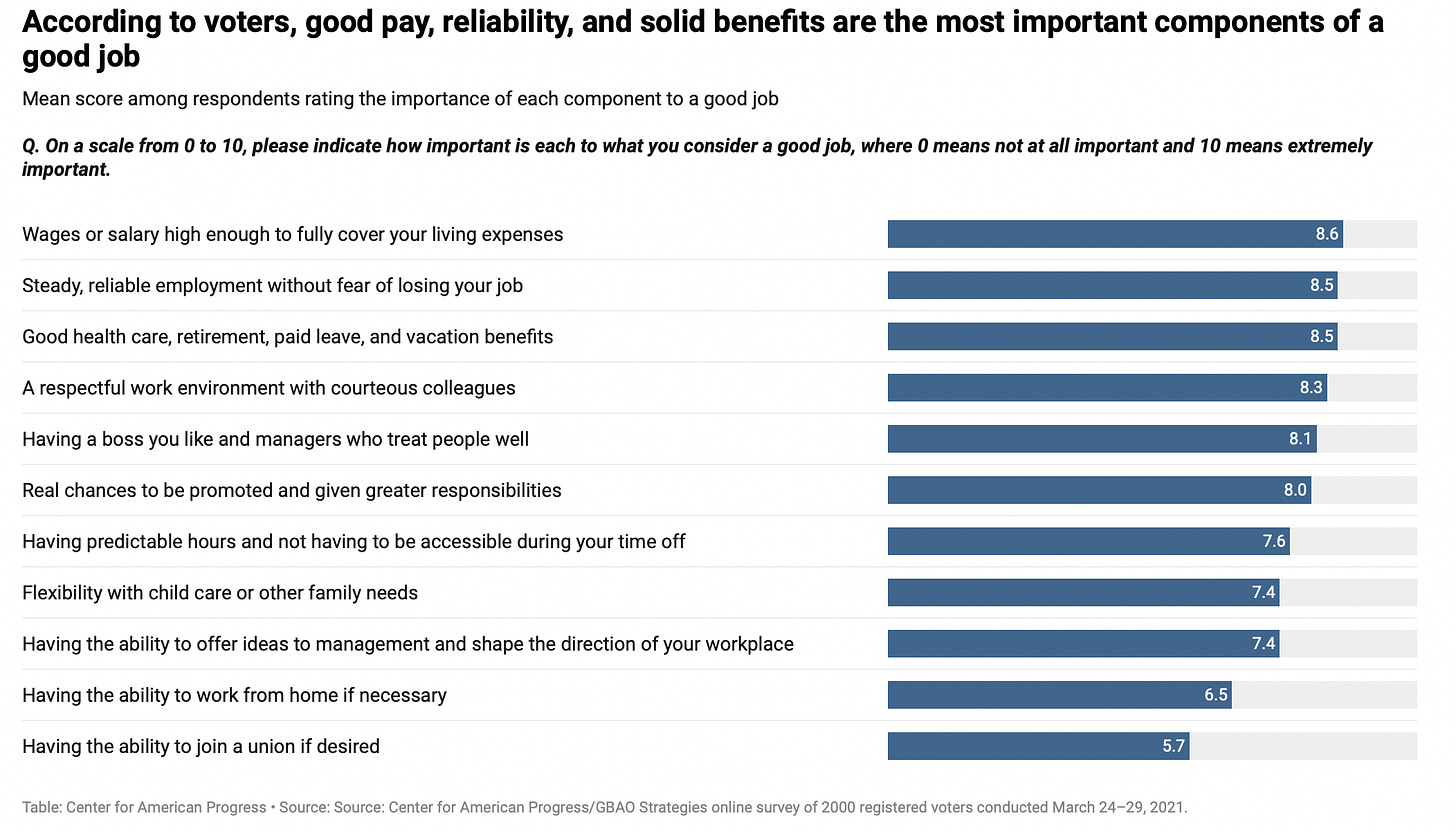What exactly is a “good job”?
American voters know what this means to them personally: decent pay, reliability, and solid benefits.
TLP recently covered the foreign policy aspects of new public opinion work the team designed to examine voter attitudes on post-Covid economic recovery and rebuilding. Overall, this research shows strong support for national investments in the sources and sectors of new jobs including science and technology, education, health care, domestic manufacturing, and research and development. Voters across party lines understand the importance of both private and public efforts to fuel job creation, strengthen American businesses to keep them competitive with China, and ensure that American workers and their families are financially secure.
At the center of these policy ideas is the somewhat amorphous goal of producing more “good jobs”. What exactly does this mean?
Our study posed this question to voters directly, asking them to rate a series of job characteristics on a ‘0’ to ‘10’ scale in terms of how important each item is to their own understanding of what makes something a good job. As the chart below highlights, voters across demographic lines converge uniformly on three major characteristics of a good job: decent pay, reliability, and solid benefits.
A second tier of good job characteristics covers the quality of employment itself, things like a respectful work environment, having a boss you like and who treats people well, and real chances for promotion and more responsibilities on the job. Flexibility with child care and the ability to work from home are also important aspects of a good job to voters, but relatively less important than their main concerns around pay, stability, and benefits. Having the ability to join a union if desired emerges at the bottom of the list, primarily driven by very low ratings from Republicans.
Knowing that voters desire good jobs with living wages, stability, and decent benefits, how should political leaders approach creating more of them? To start, they could embrace a basic framework of national action to help drive growth in multiple sectors and bolster clean energy jobs and businesses specifically (rather than talking about the “climate crisis” which divides voters):
Another statement pair presented respondents with two competing ideas about the proper role of government in creating jobs and driving investments. Fifty-eight percent of voters overall—including 80 percent of Democrats and 52 percent of independents—say they agree more with the idea, “The government should help drive public and private investments into the sources of good jobs such as technology, infrastructure, health care, higher education, and domestic manufacturing.” Meanwhile, slightly more than one-third of voters overall, and a majority of Republicans, agree more with the alternative free market notion: “The government should stay out of the economy and allow the private sector and open markets to determine what to invest in and where to allocate resources.”
Majorities of voters across generational lines back a role for government in helping to drive public and private investments in the sources and sectors of good jobs.
The study finds almost identical patterns of agreement on the issue of whether fighting climate change is good or bad for the economy. Fifty-eight percent of voters overall, and more than 8 in 10 Democrats and half of independents, say they agree more with the idea, “Fighting climate change is good for America’s economy because it creates new jobs and supports American businesses that are producing cleaner energy.” Conversely, 35 percent of voters overall, and nearly 6 in 10 Republicans, agree more with the alternative idea: “Fighting climate change hurts America’s economy because it threatens existing oil and gas jobs and raises the costs of energy for everyone.”
Our study also presented voters with a series of 20 different ideas for improving America’s overall economic foundation post-Covid and asked them whether they agree or disagree with each item on another ‘0’ to ‘10’ scale.
Above all, as seen below, voters first want political leaders to clean up government and for Americans themselves to stop fighting one another on social media. And importantly, they desperately want to see a more liberal commitment to equal rights and a fair chance for all people—a notable area of consensus given the rising tensions around more contemporary discussions about race and discrimination.
Beyond the desire for a more cooperative politics, a number of concrete ideas around infrastructure, closing regional economic gaps, and modernizing the social safety net also receive positive overall marks from voters, with mean agreement ranging from 7.1 to 7.4, and decent cross-partisan alignment.
Voters clearly want their political leaders and institutions to focus on the core economic challenges facing every American today, and to spend less time on irresolvable cultural battles that get nowhere and produce few positive economic changes for people.
As a result, voters see the creation of more jobs and better paying jobs—along with increased health care affordability among Democrats and Independents, and border security among Republicans—as the key markers for success in terms of getting the country back on track after the pandemic.
If President Biden and Congress can deliver these desired economic and social outcomes to voters—and convince people that their actions were at least partially responsible for creating more good jobs—Americans will likely reward them at the polls in 2022 and 2024. If not, then Republicans, despite their own internal fissures, may be well positioned to ask voters for another chance to address issues of economic recovery and growth.







